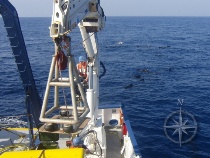6 A&S Physicists Awarded Breakthrough Prize
Our universe is dominated by matter and contains hardly any antimatter, a notion which still perplexes top scientists researching at CERN’s Large Hadron Collider. The Big Bang created equal amounts of matter and antimatter, but now nearly everything—solid, liquid, gas or plasma—is…


 A Syracuse University scientist, an alumna and an undergraduate student are exploring the deep-sea floor off the coast of Portugal this week aboard the E/V Nautilus, a 64-meter research vessel operated by Ocean Exploration Trust in collaboration with the National Oceanic and Atmospheric Administration (NOAA), and the National Geographic Society.
A Syracuse University scientist, an alumna and an undergraduate student are exploring the deep-sea floor off the coast of Portugal this week aboard the E/V Nautilus, a 64-meter research vessel operated by Ocean Exploration Trust in collaboration with the National Oceanic and Atmospheric Administration (NOAA), and the National Geographic Society.